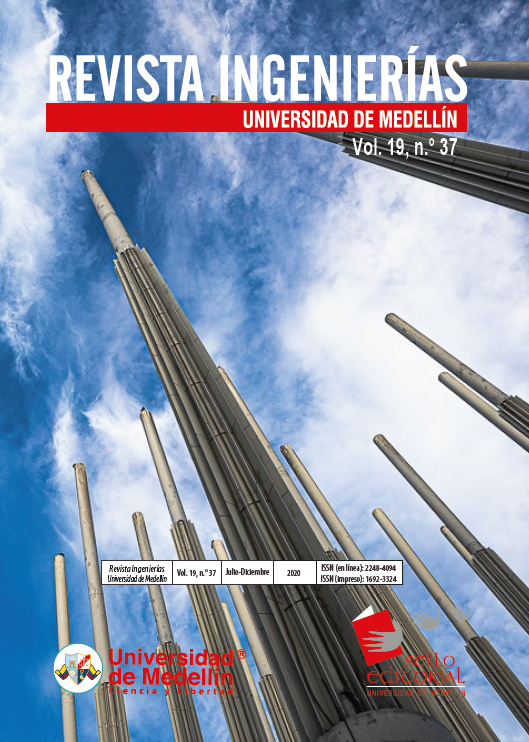Defining a Software Process Model for Modding Practice
DOI:
https://doi.org/10.22395/rium.v19n37a7Keywords:
Modding, software process, software engineering, modelAbstract
Modding is a software practice, mainly spread in the videogame community, in which interdisciplinary groups of modders are involved with the aim of creating, improving and distributing extensions, called mods, for previously released software. This is done with the purpose of extending the characteristics of base products; thus, bringing new applications, compatibility, and extensibility, among other improvements. However, various problems, similar to those present in the software development process, have been involved in this practice: Communication barriers, lack of planning, unexpected results, and work repetition, among others. Thus, seeking to integrate aspects of process engineering to support these groups and reduce the problems present in this type of project, the software process “Kross Modding Process†is proposed, which provides guidance to modders through information collected in previous studies on this area.
Downloads
References
[1] W. Scacchi, “Modding as an Open Source Approach to Extending Computer Game Systemsâ€, Int. J. Open Source Softw. Process., vol. 3, n.o 3, pp. 36-47, 2011. DOI: 10.4018/jossp.2011070103.
[2] J. Kücklich, “Precarious Playbour : Modders and the Digital Games Industry The History of Modding The Economy of Moddingâ€, The Fibreculture Journal, n.° 5, pp. 1-9, 2005.
[3] M. Trenta, “La gestión de las comunidades de modding entre explotación y participación†en Actas – V Congreso Internacional Latino de Comunicación, pp. 1-15, 2013.
[4] H. Lieberman, F. Paternò y V. Wulf, “End User Development: An Emerging Paradigmâ€, End User Dev., vol. 9, pp. 9-16, 2006. DOI: 10.1007/1-4020-5386-X.
[5] S. Guthals, S. Foster, y L. Handley, Minecraft modding for kids for dummies, Hoboken: John Wiley & Sons, 2015.
[6] A. Ceballos, L. Pantoja y J. A. Hurtado, “Entendiendo el Modding como un Proceso de IngenierÃaâ€, en Ciencias Computacionales, Cartagena, pp. 175-186, 2018.
[7] H. Postigo, “Of Mods and Modders: Chasing Down the Value of Fan-Based Digital Game Modificationsâ€, Games Cult., vol. 2, n.o 4, pp. 300-313, 2007. DOI: 10.1177/1555412007307955.
[8] W. Scacchi, “Modding as a basis for developing game systemsâ€, en Proceeding of the 1st international workshop on Games and software engineering - GAS ’11, p. 5, 2011. DOI:10.1145/1984674.1984677.
[9] A. Unger, “Modding as Part of Game Cultureâ€, en Computer Games and New Media Cultures, Dordrecht: Springer Netherlands, 2012, pp. 509-523. DOI: 10.1007/978-94-007-2777-9_32.
[10] G. Poderi y D. J. Hakken, “Modding a free and open source software video game: “Play testing is hard workâ€, Transformative Works and Cultures, vol. 15, 2013. DOI: 10.3983/twc.2014.0493.
[11] D. Johnson, “StarCraft fan craft: Game mods, ownership, and totally incomplete conversionsâ€, Velv. Light Trap, vol. 64, n.o 1, pp. 50-63, 2009. DOI: 10.1353/vlt.0.0041.
[12] O. Sotamaa, “Computer game modding, intermediality and participatory cultureâ€, New Media, pp. 1-26, 2003.
[13] K. A. Moody, “Modders: Changing the game through user-generated content and online communities.â€, Diss. Abstr. Int. Sect. A Humanit. Soc. Sci., vol. 75, n.° 11-A(E), 2015. DOI: 10.17077/etd.5ak8cz3w.
[14] E. Guilfoyle, Half-Life 2 mods for dummies, Hoboken: John Wiley & Sons, 2007.
[15] A. Gupta y A. Gupta, Minecraft modding with Forge, Estados Unidos: O’Reilly Media, 2015.
[16] E. Guilfoyle, Quake 4 mods for dummies, Hoboken: John Wiley & Sons, 2006.
[17] J. Van Gumster y C. Ammann, Farming simulator modding for dummies, Hoboken: John Wiley & Sons, 2014.
[18] O. Sotamaa, “When the Game Is Not Enough: Motivations and Practices Among Computer Game Modding Cultureâ€, Games Cult., vol. 5, n.° 3, pp. 239-255, 2010, https://doi.org/10.1177/1555412009359765.
[19] J. L. G. Sánchez, N. P. Zea y F. L. Gutiérrez, “Playability: How to identify the player experience in a video gameâ€, 2009, https://doi.org/10.1007/978-3-642-03655-2_39.
[20] R. Hong, “Game Modding, Prosumerism and Neoliberal Labor Practicesâ€, Int. J. Commun., vol. 7, pp. 984-1002, 2013.
[21] F. Ruiz y J. Verdugo, “GuÃa de Uso de SPEM 2 con EPF Composerâ€, Composer, vol. 3, p. 93, 2008. DOI: 10.13140/2.1.1455.9049.
[22] P. Ruiz, A. Quispe, M. C. Bastarrica y J. A. H. AlegrÃa, “Formalizing the Software Process in Small Companies†2012.
[23] P. Letelier, “Proceso de Desarrollo de Softwareâ€, Univ. Politécnica Val., pp. 1-14, 2003.
[24] T. Sihvonen, Players Unleashed! Modding the Sims and the Culture of Gaming, Amsterdam: Amsterdam University Press, 2011. DOI: 10.5117/9789089642011.
Downloads
Published
How to Cite
Issue
Section
License
The total or partial reproduction of the contents of the journal for educational, research, or academic purposes is authorized as long as the source is cited. For reproduction for other purposes, express authorization from the Sello Editorial Universidad de MedellÃn is required.

